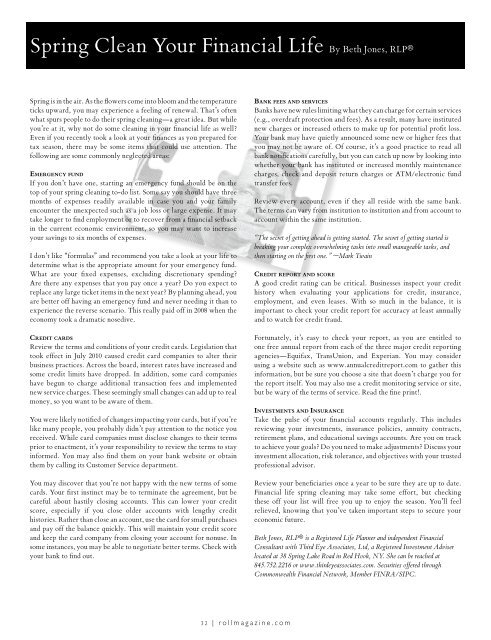Create successful ePaper yourself
Turn your PDF publications into a flip-book with our unique Google optimized e-Paper software.
Spring Clean Your Financial Life By Beth Jones, RLP®Spring is in the air. As the flowers come into bloom and the temperatureticks upward, you may experience a feeling of renewal. That’s oftenwhat spurs people to do their spring cleaning—a great idea. But whileyou’re at it, why not do some cleaning in your financial life as well?Even if you recently took a look at your finances as you prepared fortax season, there may be some items that could use attention. Thefollowing are some commonly neglected areas:Emergency fundIf you don’t have one, starting an emergency fund should be on thetop of your spring cleaning to-do list. Some say you should have threemonths of expenses readily available in case you and your familyencounter the unexpected such as a job loss or large expense. It maytake longer to find employment or to recover from a financial setbackin the current economic environment, so you may want to increaseyour savings to six months of expenses.I don’t like “formulas” and recommend you take a look at your life todetermine what is the appropriate amount for your emergency fund.What are your fixed expenses, excluding discretionary spending?Are there any expenses that you pay once a year? Do you expect toreplace any large ticket items in the next year? By planning ahead, youare better off having an emergency fund and never needing it than toexperience the reverse scenario. This really paid off in 2008 when theeconomy took a dramatic nosedive.Credit cardsReview the terms and conditions of your credit cards. Legislation thattook effect in July 2010 caused credit card companies to alter theirbusiness practices. Across the board, interest rates have increased andsome credit limits have dropped. In addition, some card companieshave begun to charge additional transaction fees and implementednew service charges. These seemingly small changes can add up to realmoney, so you want to be aware of them.You were likely notified of changes impacting your cards, but if you’relike many people, you probably didn’t pay attention to the notice youreceived. While card companies must disclose changes to their termsprior to enactment, it’s your responsibility to review the terms to stayinformed. You may also find them on your bank website or obtainthem by calling its Customer Service department.You may discover that you’re not happy with the new terms of somecards. Your first instinct may be to terminate the agreement, but becareful about hastily closing accounts. This can lower your creditscore, especially if you close older accounts with lengthy credithistories. Rather than close an account, use the card for small purchasesand pay off the balance quickly. This will maintain your credit scoreand keep the card company from closing your account for nonuse. Insome instances, you may be able to negotiate better terms. Check withyour bank to find out.Bank fees and servicesBanks have new rules limiting what they can charge for certain services(e.g., overdraft protection and fees). As a result, many have institutednew charges or increased others to make up for potential profit loss.Your bank may have quietly announced some new or higher fees thatyou may not be aware of. Of course, it’s a good practice to read allbank notifications carefully, but you can catch up now by looking intowhether your bank has instituted or increased monthly maintenancecharges, check and deposit return charges or ATM/electronic fundtransfer fees.Review every account, even if they all reside with the same bank.The terms can vary from institution to institution and from account toaccount within the same institution.“The secret of getting ahead is getting started. The secret of getting started isbreaking your complex overwhelming tasks into small manageable tasks, andthen starting on the first one.” ~Mark TwainCredit report and scoreA good credit rating can be critical. Businesses inspect your credithistory when evaluating your applications for credit, insurance,employment, and even leases. With so much in the balance, it isimportant to check your credit report for accuracy at least annuallyand to watch for credit fraud.Fortunately, it’s easy to check your report, as you are entitled toone free annual report from each of the three major credit reportingagencies—Equifax, TransUnion, and Experian. You may considerusing a website such as www.annualcreditreport.com to gather thisinformation, but be sure you choose a site that doesn’t charge you forthe report itself. You may also use a credit monitoring service or site,but be wary of the terms of service. Read the fine print!.Investments and InsuranceTake the pulse of your financial accounts regularly. This includesreviewing your investments, insurance policies, annuity contracts,retirement plans, and educational savings accounts. Are you on trackto achieve your goals? Do you need to make adjustments? Discuss yourinvestment allocation, risk tolerance, and objectives with your trustedprofessional advisor.Review your beneficiaries once a year to be sure they are up to date.Financial life spring cleaning may take some effort, but checkingthese off your list will free you up to enjoy the season. You’ll feelrelieved, knowing that you’ve taken important steps to secure youreconomic future.Beth Jones, RLP® is a Registered Life Planner and independent FinancialConsultant with Third Eye Associates, Ltd, a Registered Investment Adviserlocated at 38 Spring Lake Road in Red Hook, NY. She can be reached at845.752.2216 or www.thirdeyeassociates.com. Securities offered throughCommonwealth Financial Network, Member FINRA/SIPC.32 | rollmagazine.com




